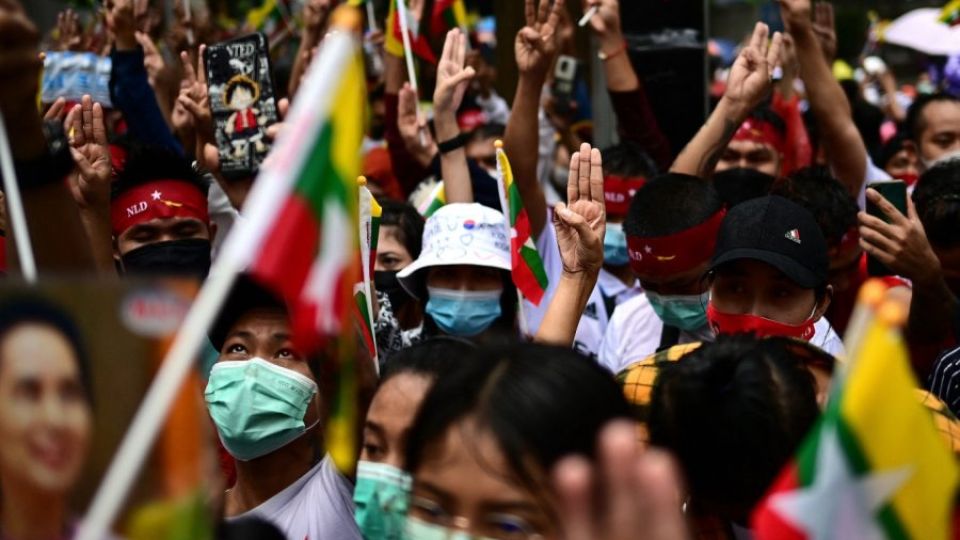June 23, 2023
JAKARTA – Indonesia’s strategy of engaging intensely with Myanmar’s stakeholders lacks any real pressure and is unlikely to result in meaningful changes, United Nations special rapporteur Tom Andrews said on Wednesday.
ASEAN is moving at a glacial pace, he asserted, meanwhile the regression of its own member states through granting the junta legitimacy continues to wreak havoc on the bloc’s credibility.
But the Foreign Ministry argued that its strategy has yielded measurable results, and that claims of the association backsliding are “factually incorrect”.
Expectations, which began high at the onset of Indonesia’s chairmanship, have noticeably dwindled nine months into Jakarta’s leadership as the situation in Myanmar has continued to worsen.
In April, the most fatal air strike since the February 2021 coup took place in Myanmar’s Sagaing region, followed by an attack on ASEAN’s humanitarian envoys in early May.
Analysts and observers alike have expressed the opinion that no observable progress can be seen concerning the ASEAN peace initiative, the Five-Point Consensus (5PC), which calls for the cessation of violence, dialogue among all parties, the appointment and engagement of a special envoy and humanitarian assistance.
And while Jakarta maintains that its chairmanship has successfully brought about inclusive dialogue with Myanmar’s contesting factions via some 75 engagements, seven out of 10 ASEAN member states this week took the task of engagement upon themselves and stepped beyond the group’s boundaries to join a meeting in Thailand with junta representatives, exposing deep cracks within the organization.
Read also: Thailand snubs ASEAN with Myanmar meet
Brunei, Cambodia, Laos, Vietnam and the Philippines all took part in the meeting, news reports said. No details of the talks were published, though Thailand’s Foreign Minister Don Pramudwinai said that the group did not reach any agreement or conclusions.
Andrews, who on Wednesday concluded his eight-day Indonesia trip to hold discussions with Indonesian officials, said that ASEAN was regressing in its Myanmar strategy, and was enabling the junta to amplify its propaganda.
“[The Thailand meeting] is an example of ASEAN moving backward by extending a sense of legitimacy to the junta; the very junta officials responsible for these horrific crimes against the people of Myanmar,” he told reporters.
“The junta continues to co-chair the meetings of the experts’ working group of ASEAN Defense Ministers’ Meeting-Plus [ADMM-Plus], along with Russia. Indonesia participates in these meetings.”
In response to the junta’s continued defiance of the 5PC, ASEAN in 2021 barred any of Myanmar’s political representatives from partaking in the group’s high-level meetings, followed by Indonesia’s more aggressive proposal last year to bar all representatives. This proposal, however, was rejected by some ASEAN states, effectively allowing some senior junta members to play leadership roles in the group’s lower-level meetings.
Since assuming the ASEAN chairmanship this year, Indonesia has focused a large proportion of its efforts on engaging with Myanmar’s stakeholders, arguing that inclusive dialogue is the single most important aspect of facilitating peace in the conflict-torn country.
Read also: Thailand defends divisive Myanmar junta talks
Yet speaking to The Jakarta Post later on Wednesday, Andrews suggested that Indonesia’s engagement efforts were likely to lead nowhere without any real efforts to impose pressure on the junta.
“I’m anxious to see how [Indonesia’s diplomacy] turns out. My recommendation is that it be complemented by the application of leverage. Engagement is necessary, but it’s not sufficient,” Andrews said.
“It’s not going to go anywhere. My point is that pressure, leverage; that is the key ingredient missing.”
Unity needed
It was not the lack of Indonesia’s efforts that granted the junta a sense of legitimacy, the Foreign Ministry told the Post in a response to Andrews’ comments. The claim that ASEAN has regressed under its chairmanship was simply inaccurate, the ministry said, though admitting that they could do more about the Myanmar crisis.
The core of the problem, according to the ministry, was the lack of commitment by other countries to upholding ASEAN unity by attending talks that contravened the 5PC in Thailand.
Meanwhile, Ngurah Swajaya, the ministry’s coordinator for the office of the special envoy on Myanmar, said: “Assumptions that the 5PC has yet to see any progress are simply false, because there are advancements on the humanitarian front. ASEAN did not have access to deliver relief prior to Indonesia’s chairmanship.”
“On the implementation of the 5PC, [it is imperative] that all countries intensify their efforts to uphold ASEAN unity,” he added.
Separately, former Indonesian foreign minister Marty Natalegawa said: “The situation in Myanmar remains as a litmus test for ASEAN. Despite ASEAN’s collective efforts, including by Indonesia as it’s current chair, the situation in Myanmar has actually worsened.”
“Significantly still, ASEAN’s collective response to the developments is showing fragility. Division and sense of policy drift are creeping in. A policy of more of the same does not suffice. Indonesia is called upon to use all its diplomatic capacity and ingenuity to reverse these negative trends,” he told the Post.
Defending the Indonesian side, another former top diplomat, Hassan Wirajuda, admitted how the coup crisis had become a “graveyard for all special envoy missions”, including eight attempts by the UN and two from ASEAN.
It also led Hassan to question the UN’s own ability to improve the human rights situation in Myanmar, diminishing the UN special rapporteur’s credibility to criticize others.
“Has the [situation] improved despite successive appointments of human rights rapporteurs, who only observed the situation in Myanmar from countries bordering it?” he said to the Post.
“Don’t forget that when you point one finger at another person, your other four fingers are directed at yourself.”
Editor’s note: Updated with new comments.


